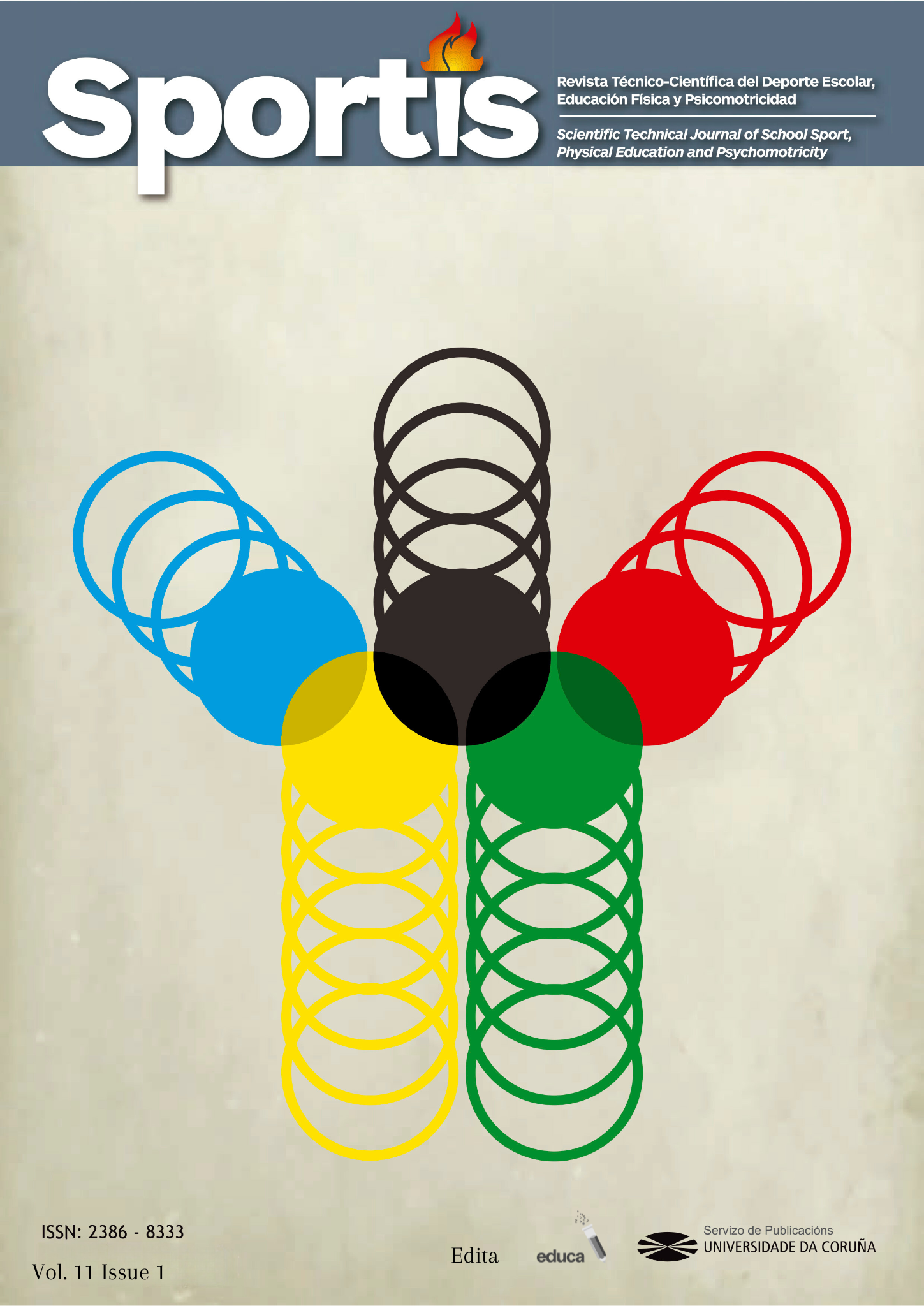Opportunities for social inclusion for people with intellectual disability through a Service-Learning program
Main Article Content
Abstract
The aim of present study was to evaluate the effect of a University Service-Learning experience in the achievement of social inclusion of people with intellectual disabilities, offering opportunities to practice physical activity in normalized environments, through case studies in qualitative research. The study participants were four people with intellectual disabilities who belong to a sports club; In addition, the service providers, 28 students from a Spanish Faculty of Education, the coach of the sports club and the teacher of the subject have taken part as informants. The instruments used for the collection of information have been the focus group, the group reflection, the semi-structured interview and the field notes. The results showed how the experience has increased the possibilities of practicing physical activity for the recipients of the service. They fundamentally valued the treatment received and the positive attitudes of the service providers, which contributed to generating a practice environment based on cooperation. The participants have had fun during the experience, they have felt part of the group and show their desire to stay in the activity. The practical implications of the findings are discussed below. The findings are presented beside future proposals.
Keywords:
Downloads
Article Details
References
Ainscow, M., Booth, T. y Dyson (2006). Improving Schools, Developing Inclusion. Routledge.
Allen, G., Milne, B., Velija, P., y Radley, R. (2024). ‘Hearing their voice’: the experiences of physical education with pupils diagnosed with severe learning disabilities. Sport, Education and Society, 29(3), 342–357. https://doi.org/10.1080/13573322.2022.2141704
Allport, G. W. (1954). The nature of prejudice. Addison-Wesley. https://doi.org/10.4324/9780203967157
Aramburuzabala, P., Santos-Pastor, M. L., Chiva-Bartoll, O., y Ruiz-Montero, P. J. (2019). Perspectivas y retos de la intervención e investigación en aprendizaje-servicio universitario en actividades físico-deportivas para la inclusión social. Publicaciones, 49(4), 19–27. https://doi.org/10.30827/publicaciones.v49i4.11726
Badia, M. (2006). La calidad de vida en el ocio de las personas con discapacidad. En M. A. Verdugo (Dir.), Cómo mejorar la calidad de vida de las personas con discapacidad. Instrumentos y estrategias de evaluación (pp. 365 - 377). Salamanca: Amarú: Colección Psicología.
Badia, M., y Longo E. (2009). El ocio en las personas con discapacidad intelectual: participación y calidad de vida a través de las actividades de ocio. Siglo Cero, 40(3), 30-44.
Block, M. E., y Fines, A. (2022). Examining physical activity for individuals with disabilities through a social justice lens. Kinesiology Review, 11(1), 80-87. https://doi.org/10.1123/kr.2021-0052
Block, M. E., Haegele, J., Kelly, L., y Obrusnikova, I. (2021). Exploring Future Research in Adapted Physical Education. Research Quarterly for Exercise and Sport, 92(3), 429-442. https://doi.org/10.1080/02701367.2020.1741500
Borland, R. L., Hu, N., Tonge, B., Einfeld, S., y Gray, K. M. (2020). Participation in sport and physical activity in adults with intellectual disabilities. Journal of Intellectual Disability Research, 64(12), 908-922. https://doi.org/10.1111/jir.12782
Calle-Molina, M. T., Aguado-Gómez, R., Sanz-Arribas, I., Ponce-Garzarán, A., López-de-Arana Prado, E., y Vizcarra-Morales, M. T. (2022). ¿Qué presencia tienen las personas receptoras en las investigaciones de Aprendizaje-Servicio en actividad física y deportiva? Didacticae, 12, 32-45. https://doi.org/10.1344/did.2022.12.32-45
Devís-Devís, J. (2006). Socially Critical Research Perspectives. En D. Kirk, D. Macdonald, & M. O’Sullivan (Eds.), Handbook of Physical Education (pp. 37-58). Sage. https://doi.org/10.4135/9781848608009.n3
Francisco-Garcés X., Salvador-Garcia C., Chiva-Bartoll O., y Santos-Pastor M. L. (2024). Críticas y propuestas para mejorar la investigación sobre aprendizaje-servicio universitario en el ámbito de la actividad física y el deporte: una aproximación cualitativa basada en pensar con la teoría. Revista Complutense de Educación, 35(1), 11-20. https://doi.org/10.5209/rced.82318
García-Pérez, Á., y López-Vélez, A. (2019). Contribución del aprendizaje-servicio a la experiencia educativa democrática de las personas con necesidades educativas especiales en base al pensamiento de Dewey. Revista de Educación Inclusiva, 12(1), 11–30.
Hodge, S. R., Murata, N. M., Block, M. E., y Lieberman, L. J. (2019). Case Studies in Adapted Physical Education: Empowering Critical Thinking (2nd ed.). Routledge. https://doi.org/10.4324/9780367824488
Hutzler, Y., Fliess-Douer, O., Abraham, A., Reiter, S., y Talmor, R. (2007). Effects of short-term awareness interventions on children’s attitudes toward peers with a disability. International Journal of Rehabilitation Research, 30(2), 159-161. https://doi.org/10.1097/MRR.0b013e32813a2eb6
Lather, P. A. (1991). Getting smart. Feminist research and pedagogy with/in the postmodern. Routledge. https://doi.org/10.4324/9780203451311
McKay, C. (2018). The value of contact: unpacking Allport´s Contact Theory to support inclusive education. Palaestra, 32(1), 21-25.
McKay, C., Block, M., y Park, J. Y. (2015). The impact of paralympic school day on student attitudes toward inclusion in physical education. Adapted Physical Activity Quarterly, 32(4), 331-348. https://doi.org/10.1123/APAQ.2015-0045
Morán, L., Gómez, L., y Alcedo M. A. (2019). Inclusión social y autodeterminación: los retos en la calidad de vida de los jóvenes con autismo y discapacidad intelectual. Siglo Cero, 50 (3), 29-46. http://dx.doi.org/10.14201/scero20195032946
Otten, R., Faughnan, M., Flattley, M., y Fleurinor, S. (2022). Integrating equity, diversity, and inclusion into social innovation education: a case study of critical service-learning. Social Enterprise Journal , 18, 182-200. https://doi.org/10.1108/SEJ-11-2020-0101
Palape, I., Sepúlveda, G., Bizkarra, M. T., y Gamito, R. (2022). Luces y sombras del aprendizaje-servicio: dificultades y decisiones para poner en marcha los proyectos. RIDAS, Revista Iberoamericana de Aprendizaje Servicio, 13, 1-18. https://doi.org/10.1344/RIDAS2022.13.1
Quass, M., y Fraser, K. (1994). Beyond the Ramp: People with Disabilities Accessing ACE Services. Australian Association of Adult and Community Education.
Schalock, R. L. (2000). Three decades of quality of life. Focus on autism and other developmental disabilities, 15(2), 116-127. https://doi.org/10.1177/108835760001500207
Soto, R. I., y López, M. A. (2017). Jugar y construir: experiencias de participación de niños con discapacidad intelectual de segundo ciclo básico en dos escuelas municipales en Chile. Siglo Cero, 48(2), 61-79. https://doi.org/10.14201/scero20174826179
Susinos, T. (2007). “Tell me in your own words”: disabling barriers and social exclusion in young persons. Disability & Society, 22(2), 117-127. https://doi.org/10.1080/09687590601141501
Zamosc, L. (1992). Campesinos y sociólogos: reflexiones sobre dos experiencias de investigación activa. En M. E. Salazar (Ed.), La investigación acción participativa. Inicios y desarrollos (pp. 85-134). Popular: SE Quinto Centenario.







